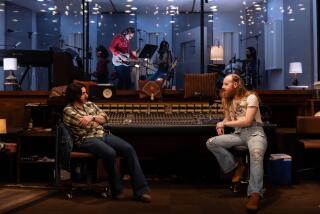Up The Coast : BACKSTAGE: ‘THE RIVALS’ : Age of the Absurd : The play catches--and exaggerates--the excessive speech, mannerisms and dress of 18th-Century England.
- Share via
She may say “no, no” but her fan says “yes, yes.” A woman in 18th-Century England might have told a suitor she was not interested in him, but a peek over her fan sent a contradictory message. This was the age of coded communication, theatrical gestures and grandiose style.
During the 18th Century in England, the upper-classes seemed to make everything bigger than life. Clothes were huge, elaborate costumes. Sentences were punctuated with a flourish of gestures. And anything that could be said clearly in one sentence was said in six.
Sheridan’s “The Rivals,” which opened last Friday in Santa Barbara, captures the pomp, the beauty and the absurdity of this period. “Our biggest challenge with the play has been this exaggerated, theatrical style of the time, which is rather foreign to us,” said Robert Weiss, director of Ensemble Theatre’s production.
“We’re accustomed to a more natural, casual style. But they were anything but natural. A man’s stance, a way a woman fanned herself; every movement was controlled and had a meaning.”
The cast is also being challenged by the varying English accents and by the tempo of speech. Like everything else of the time, sentences were adorned with frills and had elaborate structures. And the double meanings were a highly cultivated art form.
Because the play is a satirical piece, some of the characters are even more exaggerated than their historical counterparts. But overall, the pompous lifestyle Sheridan portrays is accurate, said Weiss, whose office is cluttered with the many books he read to research the play.
The action takes place in Bath, England--the spot where everyone who was anyone went to be seen. Imagine a weird melange of Las Vegas, Vale and Spago.
The practical excuse for visiting Bath was to soak in the curative waters of its hot springs. Men, wearing jackets, drawers and hats, and woman, covered from head to toe in layers of clothing, went to the city’s baths to relax in 100-degree water. Whether any of it actually penetrated the layers of clothes is a mystery.
“They were strapped in so tightly in their corsets it was hard to breathe. . . . No wonder they kept fainting,” Dunn said.
Although fashion, speech and mores have changed, Evans said that people have stayed the same. As Weiss writes in the playbill: “In a world where things change so rapidly . . . two things remain constant: love and laughter.”
More to Read
The biggest entertainment stories
Get our big stories about Hollywood, film, television, music, arts, culture and more right in your inbox as soon as they publish.
You may occasionally receive promotional content from the Los Angeles Times.










